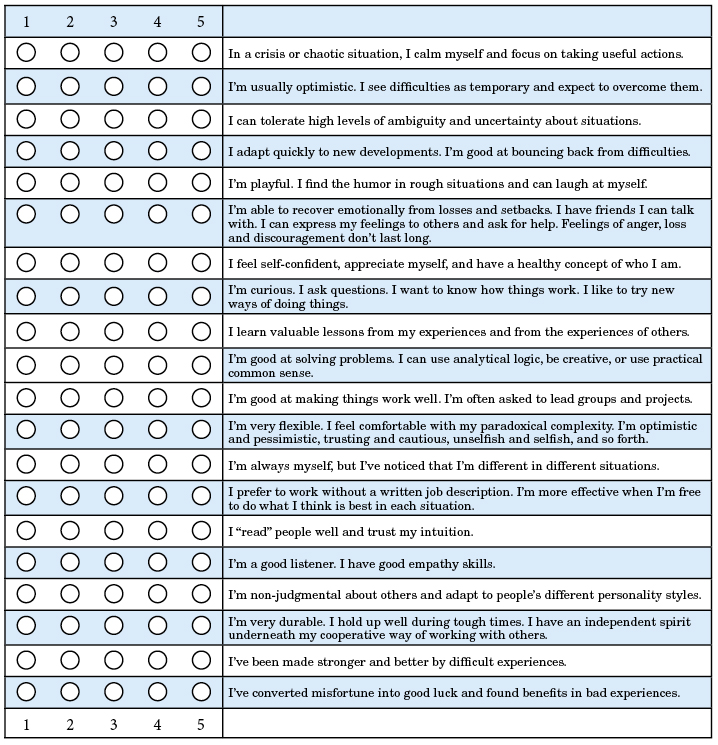Beyond Insurance
By F. Scott Addis, CPCU, CRA, CBWA, TRA
RESILIENCE: YOUR GREATEST ALLY IN YOUR QUEST FOR SUCCESS
Do you have what it takes to bounce back from adversity?
In today’s hypercompetitive world, it takes more than hard work to succeed. You must be willing to put yourself out there—even when you are faced with the fear of failure. Simply put, to move to the next level, you must take risks. And as you have experienced first-hand, these risks do not always bear fruit. For that reason, resilience is your greatest ally in your quest for success.
What is resilience? It is that amazing trait that enables you to recover quickly from difficulties. When you are resilient, you can be at peace with humanity. Perhaps that it is because your mistakes along the way have humbled you, or life experiences have helped you accept your own vulnerabilities.
Let’s take a look at the lives of three famous people who prove these points: J.K. Rowling, Colonel Harland Sanders, and Oprah Winfrey.
Resilience is an ineffable quality that allows you to get knocked down and come back stronger than before.
J.K. Rowling had just gotten a divorce, was on government aid, and could barely afford to feed her baby just three years before the first Harry Potter book was published. When she was shopping it in 1994, she was so poor that she couldn’t afford a computer or even the cost of photocopying the 90,000-word novel, so she manually typed out each version to send to publishers. The manuscript was rejected dozens of times until finally Bloomsbury, a small London publisher, gave it a second chance after the CEO’s eight-year-old daughter fell in love with it.
Colonel Harland Sanders was fired from a variety of jobs before he started cooking chicken in his roadside Shell service station in 1930, during the Great Depression, when he was 40 years old. Worried about how he was going to survive on his meager $105 monthly pension check, he set out to find restaurants that would franchise his secret recipe for a nickel for each piece of chicken sold. He drove around, sleeping in his car, and was rejected more than 1,000 times before finally finding his first partner.
Oprah Winfrey has dealt with a lot throughout her public life—criticism about her weight, racism, intrusive questions about her sexuality, to name a few—but she never let it get in the way of her ambition and drive. Growing up, Oprah was reportedly a victim of sexual abuse and was repeatedly molested by her cousin, an uncle, and a family friend. At age 14 she became pregnant and gave birth to a child who died just two weeks later. But Oprah persevered, going on to finish high school as an honors student, earning a full scholarship to college, and working her way up through the ranks of television, from a local network anchor in Nashville to an international superstar and creator of her OWN network.
The way these three people handled adversity and surmounted obstacles shows that resilience is an ineffable quality that allows you to get knocked down and come back stronger than before. Rather than letting challenges, difficulties, or failure overcome you and drain your resolve, you find ways to rise from the ashes.
Resiliency Quiz
The 20-question “Resiliency Quiz” was created by the late Al Siebert, Ph.D., author of The Resiliency Advantage and The Survivor Personality and founder of the Al Siebert Resiliency Center.
Rate yourself from 1 to 5 on the following: (1 = very little, 5 = very strong)
Scoring:
80 or higher Congratulations. Resilience is your ally.
65 – 80 You recover from difficulties better than most.
50 – 65 Your adversity coping mechanisms are adequate, but work to improve.
40 – 50 Take time to appreciate how resiliency can help you.
40 or under: You react poorly to unexpected challenges. Don’t fret. Learn from others who have mastered this trait.

Characteristics of resilient people
Having taken the Resiliency Quiz, do you have a greater appreciation for the qualities of resilient people? While research confirms that people’s coping skills in a crisis vary significantly, resilient individuals are able to manage their feelings, maintain perspective, and retain control as they tackle problems.
An October 27, 2015, article in Inc. magazine by Jeremy Goldman suggests that resilient people have eight key habits:
- Resilient people are independent. They don’t rely solely on others for validation and self-worth. They are proud of who they are and what they have accomplished.
- Resilient people have a support system. Springing back from failure requires all the tools and methods that are available to you. And what better tool could you have than good friends? Your support system can talk you down from the metaphoric ledge and is crucial for helping you deal with failure, stress, and negativity.
- Resilient people look to the future. When they experience failure, setbacks, or even tragedy, resilient people realize that life goes on and that things will get better.
- Resilient people constantly strive for self-improvement. They recognize that they are not perfect and treat this as an opportunity, not a weakness. Self-improvement is always possible in anything they do.
- Resilient people embrace failure. While many people understand this principle conceptually, they struggle to put it into practice when the time actually comes. The good news? Even resilient people feel this way … for about a day. Then they reframe failure as an opportunity and start figuring out what they’re going to do with their newfound freedom.
- Resilient people don’t build their lives with dominoes. When one “domino” tumbles, the rest do not follow suit. When you allow unrelated segments of your life to affect one another negatively, you are allowing yourself to enter a vicious cycle that exacerbates each problem and ultimately makes you feel worse about it all.
- Resilient people are not rigid to the point of detriment. Unshakable inflexibility is a weakness. It’s great to have routine and structure, but you also need to be able to shuffle obligations and make room for new opportunities, or you’ll burn yourself out and won’t take advantage of lucky breaks and happenstance.
- Resilient people are human. Last, and perhaps most important, they will make mistakes and have true setbacks. But they’ll come out on the other side and pick things right up again the next day or the day after. That’s really what resilience is, after all: It’s about not giving up, even when things go badly, even when we’ve made a mistake or let ourselves down.
You now have a sense of the characteristics of resilient people. You may ask: How does one become more resilient? Below are a handful of tips:
- Work on building positive attitudes and emotional responses
- Spend time on your sense of purpose
- Develop coping strategies and use them
- Establish and nurture a supportive social network
- Look after yourself: exercise, rest, eat well
- Make time to do the things you enjoy
- Recognize and develop your natural strengths
Confucius once said: “Our greatest glory is not in never failing, but in rising every time we fall.”
Resilience: your greatest ally in your quest for success.
The author
Scott Addis is chief executive officer of Beyond Insurance and an industry leader. His agency was recognized by Rough Notes magazine as a Marketing Agency of the Month, he was a Philadelphia finalist for Inc. Magazine’s “Entrepreneur of the Year” award, and he was selected as one of the “25 Most Innovative Agents in America.”
Beyond Insurance is a consulting firm that offers leadership training, cultural transformation, and talent and tactical development for enlightened professionals who are looking to take their organization to the next level. Since 2007, the proven and repeatable processes of Beyond Insurance have transformed agencies as measured by enhanced organic growth, productivity, profitability, and value in the marketplace.
To learn more about Beyond Insurance, contact Scott at saddis@beyondinsurance.com.






